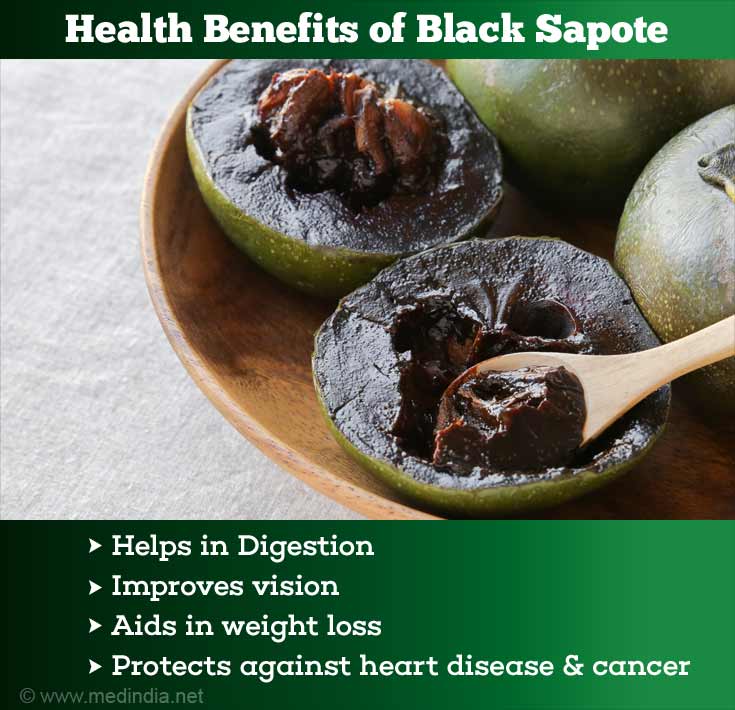- Urine Output-Increasing Activity of Formulated Tea from Black Zapote (Diospyros digyna Jacq., Ebenaceae) Leaves - (http://www.academia.edu/10259975/urine_output-increasing_activity_of_formulated_tea_from_black_zapote_diospyros_digyna_jacq._ebenaceae_leaves)
What is Black Sapote?
Black sapote (Diospyros nigra), is a tropical fruit native to eastern Mexico, the Caribbean, and Central America from the species of persimmon. It is known by various other common names such as black persimmon, chocolate-fruit and chocolate pudding fruit. Black sapote is a tomato-like fruit with a thin and firm rind. The fruit has 2 to 10 seeds that are dark red-brown colored.
Ripened black sapote has a greenish-yellow skin that is raw and inedible and a pulp dark brown in color and custard-like, therefore, called as chocolate pudding fruit. It is considered as a healthier alternative as it is low in fat and contains about four times as much vitamin C as an average orange. It is also a good source of fiber and potassium.

Black sapote is either eaten raw or, it can be mixed with milk or juices. The fruit is most often used in the preparation of smoothies, which makes it an ideal healthy dessert choice for chocolate lovers without the added calories. Black sapote is also used in the preparation of ice creams and liquors.
Health Benefits of Black Sapote
Black sapote also called as a desert fruit plays a vital role to benefit overall health due the fiber, vitamin and potassium content.
One cup of black sapote provides 142 calories, 2.6 g protein, 0.8 g fat, 34 g carbohydrate, 360 mg potassium, 22 mg Vitamin C and 420 IU Vitamin A.
Acts As an Immune Booster:
As the black sapote is a rich source of vitamin C it helps in building the body’s immune system. It helps enhance resistance against bacteria and viruses. Black sapote can be an alternative for those who do not like citrus fruits. A 100 gram of black sapote provides nearly 25 percent of the recommended daily allowance of vitamin C. As an antioxidant, vitamin C helps fight against free radical damage and protects against heart disease and cancer.
Helps in Digestion:
The fruit is good for the digestive process as it is an excellent source of dietary fiber. For those who suffer from constipation it could be a tasty and healthier alternative to other laxatives.

Improves Vision:
Black sapote is a good source of vitamin A. Experts warn that vitamin supplements might do more harm than good. So it is a healthy practice to obtain vitamin A directly from the diet. A 100 gram serving of black sapote provides 410 IU of vitamin A, which plays a major role in maintaining good eyesight. Vitamin A also helps build body’s immune system and promotes cell growth.
Provides Essential Minerals:
Potassium is an essential macromineral that plays a vital role in many bodily functions. Black sapote can be considered as a good source of potassium as it contains about 350mg of the crucial mineral. It plays a vital role in muscle development, maintains fluid-electrolyte balance and controls the heart’s electrical activity. Potassium supports normal functioning of the cells, which is the reason the lack of potassium could cause blood pressure, muscle loss and kidney problems.
Few other minerals found in black sapote are calcium, phosphorous and iron.
A 100 gram of black sapote contains 22mg of calcium, which is essential to strengthen bones and teeth and helps maintain muscle contractions and blood clotting. Phosphorous is another macro mineral that is present in similar quantities in black sapote. The fruit also provides some trace amounts of iron that plays a crucial role in the hemoglobin production.
Helps in Weight Loss:
Black sapote contains carotenoids and catechins that induce the release of fat from the fat cells and helps the liver to convert fat into energy. The fruit is very low in fat but high in carbohydrate content. A 100 gram of serving of black sapote provides about 80 calories. For those who are on a weight loss regimen, black sapote smoothie would be beneficial as it contains fewer calories and also keep satiated.

Other Benefits:
Antioxidant activity of black sapote scavenges free radicals and protects against cancer, heart disease, stroke, and other ailments. The fruit enhances the absorption of non-heme iron and promotes would healing. It also helps maintain collagen and connective tissues in the body. Vitamin E content of black sapote is higher than other tropical fruits such as strawberries. The antioxidant activity of vitamin E exerts a potential protective role in the development of diseases associated with aging.
Black Sapote Recipes
Black Sapote Mousse
Ingredients:
- Black sapote pulp - 1 cup
- Vanilla flavoring extract - 1 teaspoon
- Powdered sugar - 3 tablespoons
- Whipped cream - 1/2 cup
Method:
- Blend black sapote pulp, sugar, and vanilla extract together.
- Fold in whipped cream and serve chill, do not freeze.
Black Sapote Cake
Ingredients:
- Black sapote pulp - 2 cups
- Vanilla extract - 1 teaspoon
- Margarine - 1/2 cup
- Cinnamon - 2 teaspoons
- Honey - 1 cup
- Eggs - 3
- Baking soda -1/2 teaspoon
- Baking powder - 1/4 teaspoon
- All purpose flour - 2 cups
Method:
- Mix margarine and honey gradually. Add egg yokes and black sapote pulp.
- Combine the dry ingredients. In a separate bowl, beat the egg whites and add vanilla extract.
- Fold in the mixture to the margarine mix. Preheat, the oven to 350 degrees F. Pour the mix into the baking pan and bake for 45 minutes.








